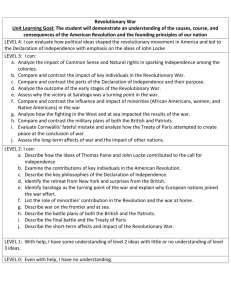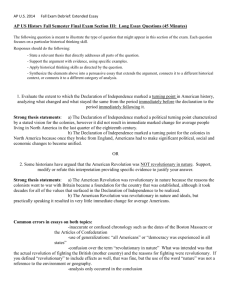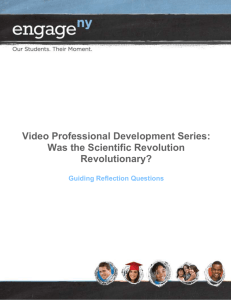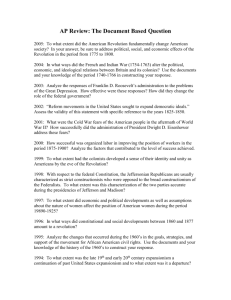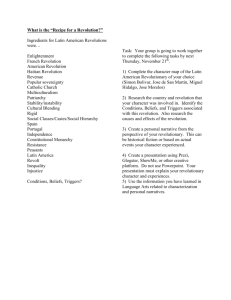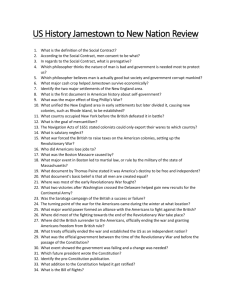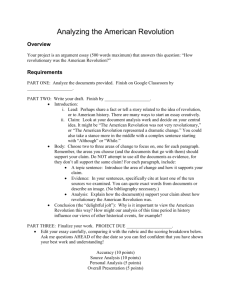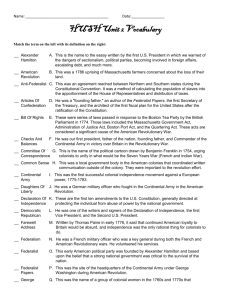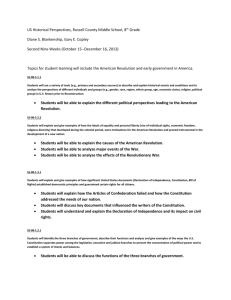Revolution and the New Nation
advertisement
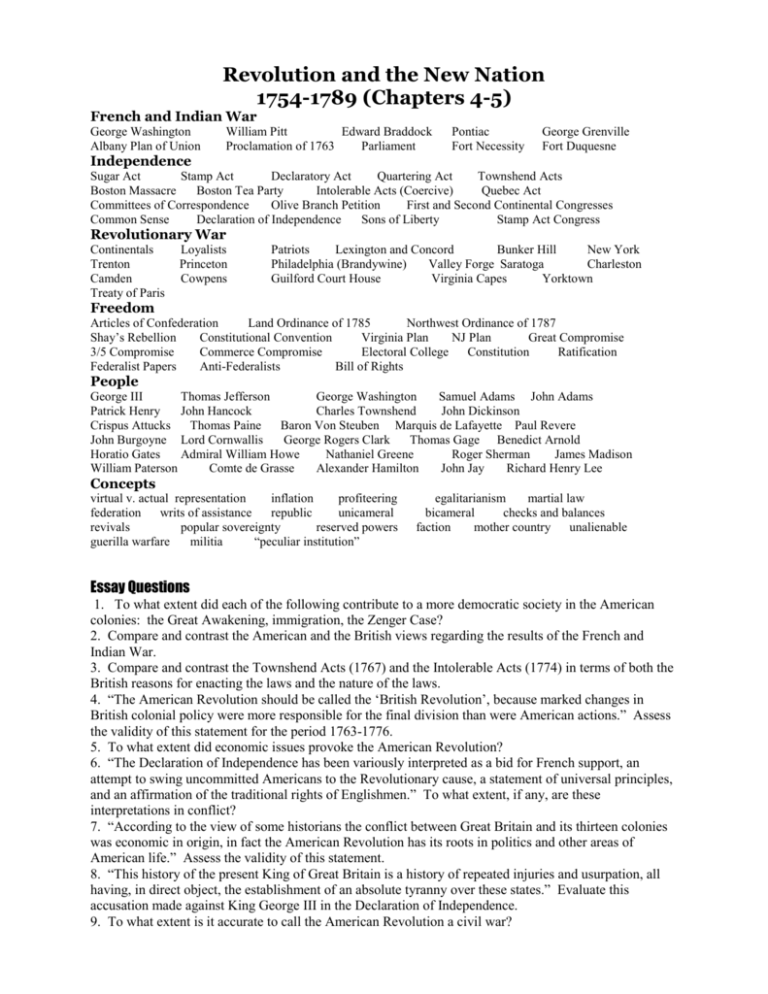
Revolution and the New Nation 1754-1789 (Chapters 4-5) French and Indian War George Washington Albany Plan of Union William Pitt Edward Braddock Proclamation of 1763 Parliament Pontiac Fort Necessity George Grenville Fort Duquesne Independence Sugar Act Stamp Act Declaratory Act Quartering Act Townshend Acts Boston Massacre Boston Tea Party Intolerable Acts (Coercive) Quebec Act Committees of Correspondence Olive Branch Petition First and Second Continental Congresses Common Sense Declaration of Independence Sons of Liberty Stamp Act Congress Revolutionary War Continentals Trenton Camden Treaty of Paris Loyalists Princeton Cowpens Patriots Lexington and Concord Bunker Hill New York Philadelphia (Brandywine) Valley Forge Saratoga Charleston Guilford Court House Virginia Capes Yorktown Freedom Articles of Confederation Land Ordinance of 1785 Northwest Ordinance of 1787 Shay’s Rebellion Constitutional Convention Virginia Plan NJ Plan Great Compromise 3/5 Compromise Commerce Compromise Electoral College Constitution Ratification Federalist Papers Anti-Federalists Bill of Rights People George III Thomas Jefferson George Washington Samuel Adams John Adams Patrick Henry John Hancock Charles Townshend John Dickinson Crispus Attucks Thomas Paine Baron Von Steuben Marquis de Lafayette Paul Revere John Burgoyne Lord Cornwallis George Rogers Clark Thomas Gage Benedict Arnold Horatio Gates Admiral William Howe Nathaniel Greene Roger Sherman James Madison William Paterson Comte de Grasse Alexander Hamilton John Jay Richard Henry Lee Concepts virtual v. actual representation inflation profiteering federation writs of assistance republic unicameral revivals popular sovereignty reserved powers guerilla warfare militia “peculiar institution” egalitarianism martial law bicameral checks and balances faction mother country unalienable Essay Questions 1. To what extent did each of the following contribute to a more democratic society in the American colonies: the Great Awakening, immigration, the Zenger Case? 2. Compare and contrast the American and the British views regarding the results of the French and Indian War. 3. Compare and contrast the Townshend Acts (1767) and the Intolerable Acts (1774) in terms of both the British reasons for enacting the laws and the nature of the laws. 4. “The American Revolution should be called the ‘British Revolution’, because marked changes in British colonial policy were more responsible for the final division than were American actions.” Assess the validity of this statement for the period 1763-1776. 5. To what extent did economic issues provoke the American Revolution? 6. “The Declaration of Independence has been variously interpreted as a bid for French support, an attempt to swing uncommitted Americans to the Revolutionary cause, a statement of universal principles, and an affirmation of the traditional rights of Englishmen.” To what extent, if any, are these interpretations in conflict? 7. “According to the view of some historians the conflict between Great Britain and its thirteen colonies was economic in origin, in fact the American Revolution has its roots in politics and other areas of American life.” Assess the validity of this statement. 8. “This history of the present King of Great Britain is a history of repeated injuries and usurpation, all having, in direct object, the establishment of an absolute tyranny over these states.” Evaluate this accusation made against King George III in the Declaration of Independence. 9. To what extent is it accurate to call the American Revolution a civil war? 10. The writings of Thomas Paine had a greater impact on the winning of American independence than any other single event, including the Battle of Saratoga.” Explain why you either agree or disagree with this statement. 11. What evidence is there for the assertion that the basic principles of the Constitution were firmly grounded in the political and religious experience of America’s colonial and revolutionary periods? 12. The Bill of Rights did not come from a desire to protect the liberties won in the American Revolution, but rather from a fear of the powers of the new federal government. Assess the validity of this idea. 13. “The genius of the Constitution is found in the series of compromises which made it acceptable to so many.” Assess the validity of this statement with respect to how the delegates at the Convention dealt with representation, the presidency, and slavery. Revolutionary Period SOL Topics VUS.4 The student will demonstrate knowledge of events and issues of the Revolutionary Period by a. analyzing how the political ideas of John Locke and those expressed in Common Sense helped shape the Declaration of Independence. b. describing the political differences among the colonists concerning separation from Britain. c. analyzing reasons for colonial victory in the Revolutionary War. VUS.5 The student will demonstrate knowledge of the issues involved in the creation and ratification of the United States Constitution and how the principles of limited government, consent of the governed, and social contract are embodied in it by: a. explaining the origins of the Constitution including the Articles of Confederation b. identifying the major compromises necessary to produce the Constitution, and the roles of James Madison and George Washington. c. describe the conflict over the ratification, including the Bill of Rights and the arguments of the Federalists and Anti-federalists. d. examining the significance of the Virginia Declaration of Rights and the Virginia Statute of Religious Freedom in the framing of the Bill of Rights. Essential Questions 1. 2. 3. 4. How can disagreement lead to revolution? How do leaders inspire, lead and bring unity to a cause? How do historians determine pivotal events? How did the American victory affect political control of North America?
